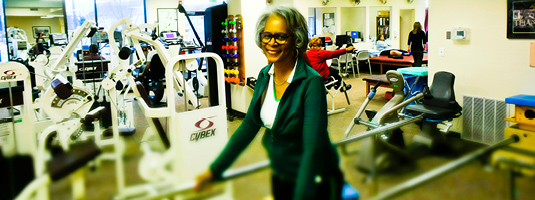Amyotrophic Lateral Sclerosis (ALS) Rehabilitation

Amyotrophic Lateral Sclerosis (ALS) is an aggressive neurodegenerative disease that is diagnosed when the nerve cells connecting a person's brain and spinal cord to muscles throughout their body become scarred, hardened or non-functional.
ALS, commonly referred to as Lou Gehrig's disease, can quickly impact voluntary muscle movement capabilities. One of the most common initial symptoms a patient may experience is muscle weakness, followed by slurred speech, trouble swallowing or ongoing, severe respiratory issues. Over time, patients who are diagnosed with ALS may struggle to speak, eat, move and breathe normally.
Managing ALS with Ongoing Rehabilitation
ALS patients who integrate rehabilitation into their overall treatment plan benefit in a number of ways:
- Cope with and manage their disease
- Delay symptoms associated with their diagnosis
- Prevent falls
- Reduce risk for injuries
- Reduce pain
- Maintain functionality for longer periods of time
- Prolong their lives
The University of Maryland Rehabilitation Network specialists are experts in caring for patients who have been diagnosed with ALS because:
- Our neurologists and outpatient therapists are specially-trained in caring for individuals with ALS and are considered experts in therapeutic approaches to help support management of the disease.
- We have the knowledge and experience necessary to accurately evaluate a patient's potential, and then develop a truly customized rehabilitation plan centered around their goals.
- The latest rehabilitation technology and a comprehensive network of resources are available to help our patients maximize functionality and independence.
- We believe caregivers play an important role as ALS patients are rehabilitating, so we spend a significant amount of time educating family members about the disease, the patient's treatment plan and how to care for them.
A Specialty Clinic Devoted to ALS Patients
The UM Rehabilitation Network's Midtown campus houses an interdisciplinary ALS Clinic, managed in partnership with the ALS Association and the Muscular Dystrophy Association. Here, patients are able to meet with doctors, nurses, therapists and nutritionists, who collaborate to address medical issues, treat symptoms and provide resources and referrals for ongoing care. Additionally, ALS patients have access to augmentative alternative communication (AAC) devices that assists patients connect with their families and care providers.
